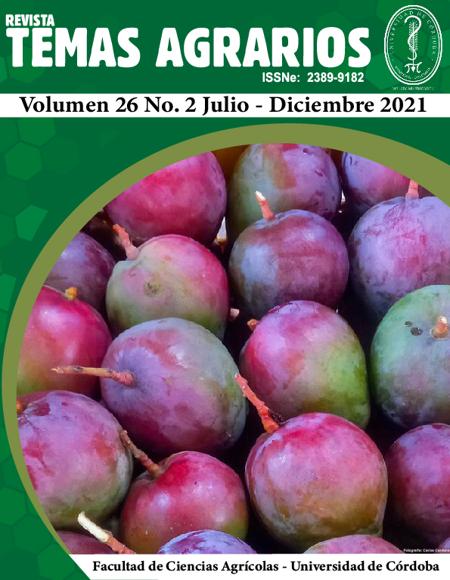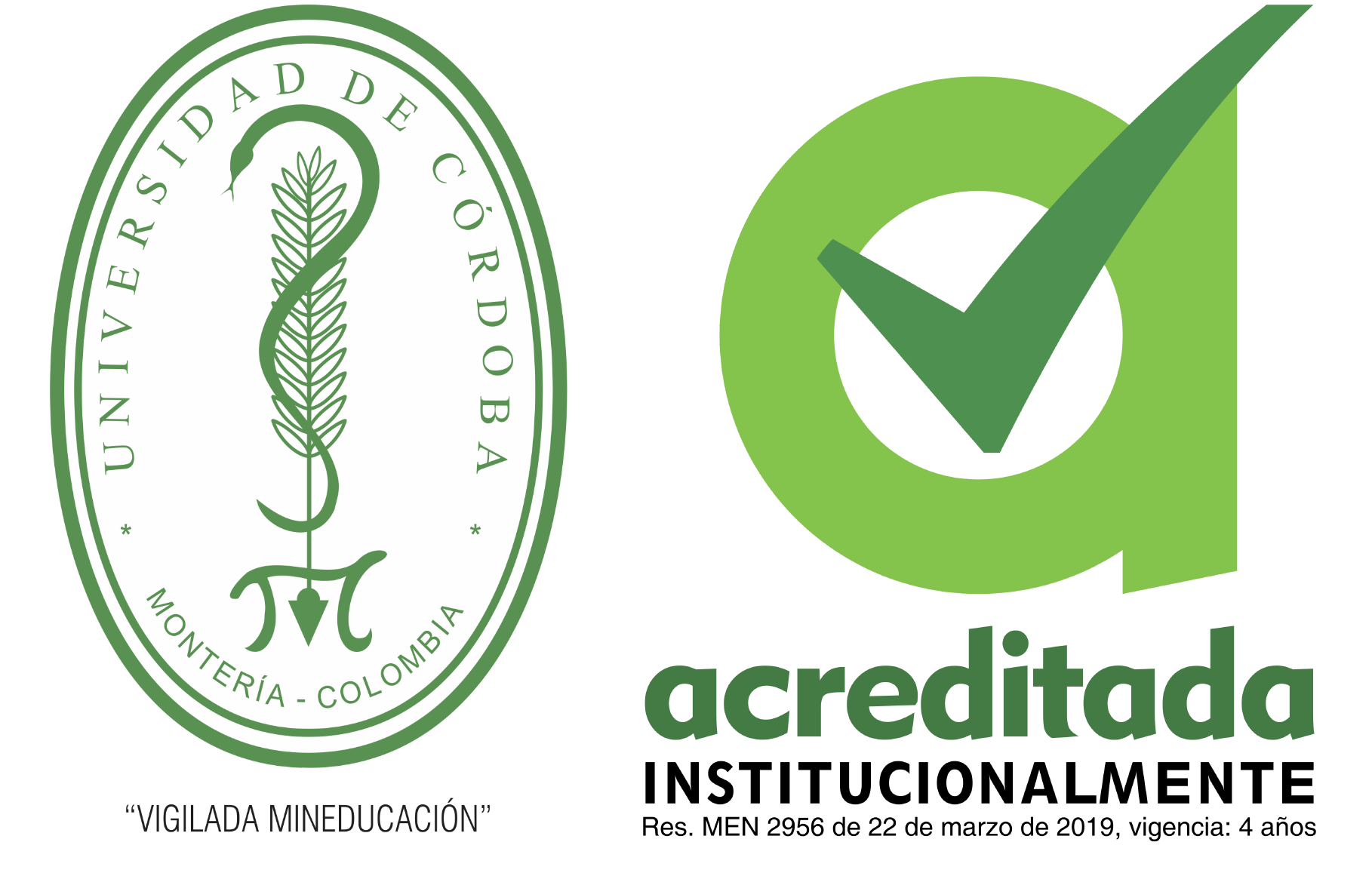Variaciones morfométricas de semillas y alternativas físico-químicas en la germinación de tamarindo (Tamarindus indica L.)
Morphometric variations of seeds and physical- chemical alternatives in the germination of tamarind (Tamarindus indica L.)

Esta obra está bajo una licencia internacional Creative Commons Atribución-NoComercial 4.0.
Mostrar biografía de los autores
La semilla de tamarindo (T. indica L.) presenta baja tasa de germinación debido a la dureza de la cubierta o cierto grado de impermeabilidad de esta, que limita imbibición y la protrusión uniforme de la radícula, lo cual conduce a la formación de plántulas con desigual crecimiento y desarrollo en los viveros. El objetivo de estudio fue identificar alternativas económicas y amigables con el ambiente, que permitan una germinación rápida con el fin de romper la dormancia. Para el estudio, se midieron las características morfométricas de 100 semillas de frutos colectados en el área de Montería, bajo un diseño de bloque completos al azar con cinco tratamientos y cinco repeticiones; cada unidad experimental estuvo conformada por 20 semillas. Los datos mostraron que las semillas son variables en su morfología, especialmente la longitud, ancho y espesor de la semilla. El tratamiento en agua caliente no promovió la germinación de la semilla. La inmersión de las semillas durante 24 horas en estiércol y orina de bovino, permitió la germinación en 11,40 y 11,80 días, con respecto al testigo, con registros de emergencia de 81,0% y 84,0%, respectivamente.
Visitas del artículo 677 | Visitas PDF
Descargas
- Bahru, T., Eshete, A., Mulatu, Y., Kebede, Y., Tadesse, W., Mohammed, O. and Dejene, T. 2014. Effect of provenances on seed germination, early survival and growth performance of Tamarindus indica l. in Ethiopia: a key multipurpose species. Advances in Materials Science and Engineering: An International Journal 1 (1):1-8.
- Balaguera-López, H.E., Fischer, G. and Magnitskiy, S. 2020. Seed-fruit relationships in fleshy fruit species: Role of hormones. A review. Revista Colombiana de Ciencias Hortícolas. 14(1):90-103. https://doi.org/10.17584/rcch.2020v14i1.10921
- Bello, A. G. and Gada, Z. Y. 2015. Germination and Early Growth Assessment of Tamarindus indica Lin Sokoto State, Nigeria. International Journal of Forestry Research, 2015, 1–5. 10.1155/2015/634108
- Cavalcante, L.F., Bezerra, F.T., Souto, A.G., Bezerra, M.A., Lima, G.S., Gheyi, H.S., Ferreira, J.F. and Cavalcante, M.Z. 2019. Biofertilizers in horticultural crops. Comunicata Scientiae Horticultural Journal. 10 (4): 415-428. https://doi.org/10.14295/CS.v10i4.3058
- Espitia-Camacho, M.M., Araméndiz-Tatis, H. and Cardona-Ayala, C.E. 2021. Correlaciones y análisis de sendero entre características del fruto y la semilla de Benincasa hispida [(Thunb.) Cogn. Temas Agrarios 26(1): 36-45. https://doi.org/10.21897/rta.v26i1.2557
- Fandohan, B., Assogbadjo, A., Kakaï, R. and Sinsin, B. 2010. Variation in seed morphometric traits, germination and early seedling growth performances of Tamarindus indica L. Int. J. Biol. Chem. Sci. 4(4): 1102-1109. https://doi.org/10.4314/ijbcs.v4i4.63047
- Fernanda da Motta, X., Eberhardt, P.E., Almeida, A., MartinS, A., Carvalho, I. and Tunes, L. 2017. Teste de condutividade elétrica em sementes de feijão miúdo (Vigna unguiculata). Revista Verde de Agroecologia e Desenvolvimento Sustentável. 12(2): 204-209. http://dx.doi.org/10.18378/rvads.v12i2.4295
- Gomes, C.D., De Sa, J.M., Rodrigues, M.H., De Oliveira Sousa, V. and Bomfim. 2019. Production of Tamarindus indica L. seedlings submitted to substrates and pre-germination methods. Pesq. Agropec. Trop., Goiânia, 49: e54029. https://doi.org/10.1590/1983-40632019v4954029
- Gordin, S.R.B., Marques, R.F., Masseto, T.E. and Scalon, S. 2012. Germinação, biometria de sementes e morfología de plântulas de Guizotia abyssinica Cass. Revista Brasileira de Sementes. 34 (4):619 – 627. https://doi.org/10.1590/s0101-31222012000400013
- Hang-Vu, T.T., Cham-Le, T.T., Hoa-Vu, D., Nguyen, T.T. and Pham, T.G. 2019. Correlations and Path Coefficients for Yield Related Traits in Soybean Progenies. Asian J Crop Sci. 11(1):32-39. https://doi.org/10.3923/pjbs.2020.425.438
- Ismael, F., Ndayiragije, A. and Fangueiro, D. 2021. New Fertilizer Strategies Combining Manure and Urea for Improved Rice Growth in Mozambique. New Fertilizer Strategies Combining Manure and Urea for Improved Rice Growth in Mozambique. Agronomy. 11, 783. https://doi.org/10.3390/agronomy11040783
- Jesús, V.A.M., Araújo, E.F., Neves, A.A., Santos, F.L., Días, L.A. and Silva, R.F. 2016. Ratio of seeds and sodium hypochlorite solution on the germination process of papaya sedes. Journal of Seed Science 38(1):057-061. http://dx.doi.org/10.1590/2317-1545v38n1151150
- Kaur, M. and Singh, S. 2016. Physicochemical, Morphological, Pasting, and Rheological Properties of Tamarind (Tamarindus indica L.) Kernel Starch. International Journal of Food Properties, 19:2432–2442. https://doi.org/10.1080/10942912.2015.1121495
- Maguire, J. D. 1962. Speed of germination-aid in selection and evaluation for seedling emergence and vigor. Crop Sci., 2: 176-177. https://doi.org/10.2135/cropsci1962.0011183X000200020033x
- Marcos-Filho, J.C. 2015. Fisiología de sementes de plantas cultivadas. 2.ed. Londrina-Paraná. ABRATES.660p.
- Monteón-Ojeda, A., Piedragil-Ocampo, B., García-Escamilla, P., Durán-Trujillo, D. and Romero-Rosales, T. 2021. Effect of imbibition treatments on the germination of Stenocereus zopilotensis (Cactaceae) native from Guerrero, Mexico. Terra Latinoamericana 39: 1-8. https://doi.org/10.28940/terra.v39i0.827
- Moreno, N.E., Miranda, D. and Martínez, F.E. 2013. Germination of sugar apple (Annona squamosa L.) sedes submitted to estratification. Revista colombiana de ciencias hortícolas 7(1):20-30.
- Muhammad, S. and Amusa, N.A. 2003. Effects of sulphuric acid and hot water treatments on seed germination of tamarind (Tamarindus indica L). African Journal of Biotechnology. 2 (9): 276-279. https://doi.org/10.5897/ajb2003.000-1056
- Patel, M., Tank, R.V., Bhanderi, R.V., Patil, H.M., Patel, V. and Desai, M. 2018. Response of soaking time and chemicals on germination and growth of tamarind (Tamarindus indica L.). Plant Archives 18(1):51-56.
- Rahman, R. 2020. Farmyard Manure, An Efficient Way of Improvin Seedling Growth of Tamarindus indica. Asian Science Bulletin. 1(3):43-44.
- Saeb, H., Khayyat, M., Zarezadeh, A., Moradinezhad, F., A. Samadzadeh, A. and Safaee, M. 2013. Effects of NaCl stress on seed germination attributes of periwinkle (Catharanthus roseus L.) and corn poppy (Papaver rhoeas L.) plants. Plant Breed. Seed Sci., 67: 115-123. http://ojs.ihar.edu.pl/index.php/pbss/article/view/309
- Sarmento, M.B., Silva, A.C.S., Villela, F.A. and Santos, K.L. 2018. Biometria de frutos e sementes e crescimento pós-seminal de Acca sellowiana (O. Berg. Burret) Myrtaceae. Caderno de Pesquisa, 30 (1): 1-8. https://online.unisc.br/seer/index.php/cadpesquisa/article/view/8696/7279
- Segato, S. V., Munduruca, L. C. and Souza, V. M. S. 2017. Sanidade de sementes e emergência de plântulas de sementes de Tamarindus indica submetidas a diferentes tratamentos pré-germinativos. Revista Nucleus, 14 (1): 237-246. https://doi.org/10.3738/1982.2278.2689
- Silva, A.L., Forte, M.J., Jacomino, A.P., Forti, V.A. and Silva, S.R. 2021. Biometric characterization and tetrazolium test in Campomanesia phaea O. Berg. Landrum sedes. Journal of Seed Science, 43: e202143013. http://dx.doi.org/10.1590/2317-1545v43240073
- Sodimu, A.I., Usman, M. B., Osunsina, O. and Awobona, T.A. 2020. Effect of Cowdung and NPK Fertilizer on the Early Growth of Tamarindus indica. L in Kaduna Northern Guinea Savanna Eco - Zone of Nigeria. Journal of Agriculture and Sustainability.13(11):1-14. https://doi.org/10.28924/ip/jas.1949
- Urrea-Galeano, L.A., Andresen, E. e Ibarra-Manríquez, G. 2018. Importancia de las interacciones semilla-mamífero para Heteroflorum (Leguminosae), un género monoespecífico endémico de México. Rev.Mex.Biodivers. 89: 497-506. https://doi.org/10.22201/ib.20078706e.2018.2.2148
- Vasantha, P.T., Vijendrakumar, R.C., Guruprasad, T.R., Mahadevamma, M. and Santhosh, K.V. 2014. Studies on effect of growth regulators and biofertilizers on seed germination and seedling growth of tamarind (Tamarindus indica L.). 14 (1): 155-160.
- Yusuf, S. C., Zakawa, N. N., Tizhel, T. D., Timon, D., Obot, J. J. and Linus, S. G. 2019. Dormancy breaking and the influence of gibberellic acid on the early growth of Tamarindus indica Seedlings in Mubi, Nigeria. Asian Journal of Soil Science and Plant Nutrition, 5(2): 1-6. https://doi.org/10.9734/ajsspn/2019/v5i230063




















